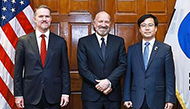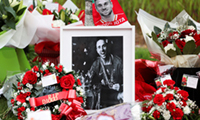Woody Allen Meets #MeToo

“That he got away with what he did to me haunted me as I grew up,” she wrote. “I was terrified of being touched by men. I developed an eating disorder. I began cutting myself. That torment was made worse by Hollywood.”
We now know that Hollywood was hiding many such secrets, and was quite uninterested in accountability for powerful bullies. After she bared her soul, Dylan was met with much “vitriol and disbelief,” as she put it.
“There were days when I thought, ‘I’ve made a terrible mistake, I should never have opened my mouth,’” Dylan told me the other day.
But in the last few months, the #MeToo movement has changed that. “I am so sorry, Dylan,” Mira Sorvino wrote. Ellen Page declared, “I did a Woody Allen movie and it is the biggest regret of my career.” Actors are donating earnings from Woody Allen movies to sexual assault organizations, and Amazon is said to be considering canceling its distribution of his movies.
All this has been “incredibly healing,” Dylan said.
Frank Maco, the Connecticut prosecutor who oversaw the case in the 1990s, told me that he watched Dylan recently on “CBS This Morning” and was impressed by how the little girl had grown up to be “strong and determined.” He reiterated what he had said at the time: that he had probable cause to bring a criminal case against Allen (who was Dylan’s adoptive father) but couldn’t justify putting a fragile child through a brutal trial.
Maco added that both Dylan and her mother, Mia Farrow, had appeared to be honorable and truthful. “Mia Farrow acted as nothing more than a concerned mother,” he said. “There was no indication that this was a fabricated story.”
I’m a friend of Dylan and her family, so I’m not an unbiased observer. But over the years I have reviewed the evidence, and on balance it persuades me. The most important contrary point is that an evaluation team from Yale New Haven Hospital concluded that Allen had not sexually abused Dylan, but it was sharply criticized by other experts. Meanwhile, the New York judge in the Mia Farrow-Woody Allen child custody case ruled that although he couldn’t be sure whether the sexual assault itself had occurred, “Mr. Allen’s behavior toward Dylan was grossly inappropriate.”
That judge, Elliott Wilk, noted that on the day of the alleged assault, a babysitter saw Allen with his head on Dylan’s lap, facing her body. A tutor soon afterward found that Dylan wasn’t wearing her underwear. And nobody has explained where Dylan and Allen went when they both disappeared as the babysitter was searching for them — except Dylan, who says that that’s when the assault happened.
Meanwhile, it turns out that Allen’s private notes over the decades are “filled with misogynist and lecherous musings,” showing “an insistent, vivid obsession with young women and girls,” according to Richard Morgan, who sifted through Allen’s 56-box archive and recounted his findings in The Washington Post.
There is always a risk that meticulous scrutiny of a long career leads to cherry-picking and finding whatever we’re looking for, especially for somebody trying to be creative and funny. I reached out to Allen through his publicist but did not receive a response. He has consistently denied the allegations of abuse, and in October he warned against allowing “a witch hunt atmosphere, a Salem atmosphere.”
Indeed, the certainty of the Dylan Farrow case is that there has been a gross injustice: Either an innocent man’s career is being destroyed, or a victim has been unfairly doubted since she confided in her pediatrician about an assault when she was 7 years old.
I asked Dylan if there was any chance that this was a false memory, that she had been brainwashed.
“No,” she said flatly. “I think it’s more logical almost that the people who accuse me of being brainwashed are brainwashed themselves by the celebrity, the glamour, the fantasy, the pull they have to Woody Allen, their hero on a pedestal.”
The larger point, she said, is not her own suffering over the years, but the need to listen to victims.
That’s where we have systematically failed — with gymnasts, with Harvey Weinstein’s victims, with the Catholic Church and with innumerable girls and boys suffering anonymously at the hands of abusive coaches, relatives, family friends or bosses. One demographer’s new estimate is that at least three-fourths of women worldwide have been sexually harassed.
Yes, false accusations happen, and we must struggle to balance rights of victims against those of the accused — but it should be obvious now that we haven’t gotten that balance nearly right. Too often, we have deferred to the powerful and doubted the weak, creating impunity and injustice.
The problem is not only abusers but more broadly a society that often disbelieves or scorns those crying for help, like that young woman curled up on her bed crying during the Golden Globes. I’ll leave her with the last word:
“What needs to change,” she said, with a teary firmness that comes from 25 years of pain, “is our response.”
<NICHOLAS D. KRISTOF>
스마터리빙
more [ 건강]
[ 건강]이제 혈관 건강도 챙기자!
[현대해운]우리 눈에 보이지 않기 때문에 혈관 건강을 챙기는 것은 결코 쉽지 않은데요. 여러분은 혈관 건강을 유지하기 위해 어떤 노력을 하시나요?
 [ 건강]
[ 건강]내 몸이 건강해지는 과일궁합
 [ 라이프]
[ 라이프]벌레야 물럿거라! 천연 해충제 만들기
 [ 건강]
[ 건강]혈압 낮추는데 좋은 식품
[현대해운]혈관 건강은 주로 노화가 진행되면서 지켜야 할 문제라고 인식되어 왔습니다. 최근 생활 패턴과 식생활의 변화로 혈관의 노화 진행이 빨라지고
사람·사람들
more
‘K-팝 아카데미’ 열린다
LA 한국문화원(원장 이해돈)은 ‘2025 K-팝 아카데미’를 7월28일(월)부터 8월15일(금)까지 미 3개 도시에서 개최한다고 밝혔다.LA…

GIFT 전인 코칭 전문학교 특별 세미나
상담, 코칭, 의학, 영성을 통합한 독자적인 교육 철학을 지닌 GIFT 전인 코칭 전문학교가 지난달 28일‘관계 회복과 소통’을 주제로 한 특…
교육원 ‘해질녘 인문학 특강’ 성료
LA 한국교육원(원장 강전훈)은 지난달 20일부터 7월2일까지 3회에 걸쳐 한인 성인을 대상으로 한‘해질녘 인문학 특강’을 진행했다. 이번 특…
가정상담소, 건강한 한인가정 만들기 교육
KFAM(한인가정상담소·소장 캐서린 염)은 지난달 16일부터 27일까지 한인 종교지도자들을 대상으로 한 ‘가정폭력 40시간 전문가 교육과정’을…
[커뮤니티 게시판] 민족학교 청소년 풍물교실 중·…
민족학교 청소년 풍물교실 중·고교생 대상 14일부터이민자 정치력 향상과 청년 리더 양성 등 활동을 하고 있는 민족학교(KRC)가 중·고교생을 …
많이 본 기사
- 트럼프 “관세율 적은 12개국 서한에 서명, 7일 발송”
- 관세협상 난항 인도, WTO에 “美상품에 보복관세 부과예정” 통보
- 국민의힘 “與, 묻지마 추경 강행…나… 1
- 李대통령, 주말에 국무회의 열어 추경 의결… “최대한 신속 집행”
- 내란특검, 尹 2차 소환… “체포영장 집행저지부터 조사…순조”
- 日도카라 열도서 ‘대지진설’ 당일 규모 5.4 지진… “우연일 뿐”
- 텍사스 폭우로 24명 사망…캠프 참가 아동 20여명 연락두절
- 돌아온 ‘핫도그 챔피언’…美 대회서 10분에 핫도그 70개 ‘꿀꺽’
- 몬트레이 한국학교 방문 2세 한국어 교육 관계자 격려
- ‘비극’ 두 아들의 사망, 부축받으며 장례식 향한 조타 친모... 포르투갈 대통령까지 ‘애도 물결’
- 머스크, ‘아메리카당’ 창당 온라인 투표… “상원 2∼3석이면 돼”
- 블랙핑크, 내일 새 월드투어 돌입…재생에너지 활용 동참
- 트럼프, 감세법 자찬하며 ‘샤일록’ 발언…유대인 비하 논란
- 세계 주요국, 美상호관세 유예 종료 앞두고 美와 막판 협상 분주
- 캘리포니아 폭염속 산불 확산…연초 이어 또 화마 공포
- 방탄소년단 뷔, 호날두·메시와 나란히.. ‘전 세계에서 가장 영향력 있는 인플루언서’ 톱3
- 특검, 尹 2차 대면조사 시작…체포저지부터 외환까지 집중 확인
- 하마스 “美 휴전안에 긍정 답변 전달…즉각 협상할 준비”
- 탬파베이 김하성, 11개월 만에 MLB 복귀…3타수 1안타 1도루
- 트럼프 발빼자 우크라 전선 밀어붙이는 푸틴…러 여름 공세
- ‘외고→연세대’ 박규영 “영어 인터뷰 화제? 부모님 뿌듯해하셔”(오겜3)
- 이병헌 “’오겜’ 인기, 인간성 부재를 전 세계가 느낀 결과”
- 트럼프, 국정의제 핵심법안 서명… “美 경제 로켓처럼 성장할 것”
- 유엔 “식량얻다 죽은 가자주민 대부분 美단체 배급소서 사망”
- ‘부인상 당한’ 신구, 아내 발인날 무대 예정대로 “관객과의 약속 소중”
- 미국 5월 무역적자 다시 확대…수입은 그대로인데 수출만 감소
- ‘김종국과 열애설’ 송지효 “남자친구 없어”..솔로 공식 발표
- “트럼프, 젤렌스키와 통화서 ‘방공지원 재개’ 의사 피력”
- AI발 ‘전력 불안’ 경고 나왔다 1
- 남북 개회식 공동입장, 아이치·나고야 아시안게임서 부활할까
- 특검 두 번째 공개 출석한 尹…무표정·무응답 속 조사실 직행
- 올트먼 오픈AI CEO, 민주당 비판하며 “소속감 느끼는 정당 없어”
- ‘상호관세 8월발효·세율↑’ 거론한 트럼프…韓美 막판협상 주목
- ‘31.8조’ 李정부 첫 추경안 국회통과…전국민 소비쿠폰 이달 지급
- 김건희특검, 삼부토건 ‘우크라 총괄’ 소환…주가 급등락 추궁
- 내란특검, 오늘 尹 2차 조사…일주일 새 더 정교해진 포위망
- 이스라엘, 휴전 논의 속 가자 공세…하마스 측 “138명 사망”
- 어기구 의원 한인회관 방문
- 내란특검, 이주호 5시간·박종준 13시간 조사…尹 혐의입증 총력
- 나토 수장 “美 무기비축 이해…우크라 지원에 유연성 희망”
- 광복절 경축식 준비위원회 모임 열려
- 2025년도 제2차 재외동포단체 지원사업 수요조사 실시
- 독일, 미국 대신 우크라에 패트리엇 지원 논의
- “트럼프, 중국 방문 추진…성사시 10월 말 가능성”
- 하마스, 가자휴전 최종 저울질…트럼프 “24시간내 결정될 것”
- “美 양호한 고용은 착시…민간 고용은 8개월 만에 최소”
1/5지식톡

-
 찬양팀 & 선교팀
0
찬양팀 & 선교팀
0남가주 멕시코 선교팀 & 찬양팀 에서 도네이션 받습니다 모든 악기 종류,악세사리, 앰프,스피커, 마이크,통기타, 전기기타, 자전거, 스쿠터,모터싸이클,드럼,키보드, 색소폰, 트럼펫, 트롬본, 베이스기타,방송 장비들…
-
 오이지 만드는 법
0
오이지 만드는 법
0안녕하세요, 보통 페르시안 오이는 쉽게 물러서 오이지를 담지 않는데요, 혹시 오이지를 만드시는 분이 계실까요? 지식나눔을 해 주신다면 감사 하겠습니다. ((꾸벅))
-
 미국세무사 시험 준비반 개강합니다
0
미국세무사 시험 준비반 개강합니다
0미국 연방세무사 (IRS Special Enrolled Agent) 시험 준비 재택공부6월2일(월) zoom를 이용한 실시간 화상강의 개강월 수 금 중부시간 저녁 9시부터 10시반까지실시간 화상 강의에 참여가 곤…
-
 한국담배보내드립니다
0
한국담배보내드립니다
0한국담배보내드립니다편의점담배 및 면세담배보내드립니다문의:voicema 카톡입니다
-
 애틀랜타 부동산 세미나에 초대합니다
0
애틀랜타 부동산 세미나에 초대합니다
0네오집스가 애틀랜타에 갑니다!안녕하세요? 미국 부동산 네오집스입니다.미국 부동산, 앞으로 어떻게 변화할까요?애틀랜타는 지금 주목해야 할 지역일까요?미국 부동산 시장의 흐름부터 애틀랜타 지역의 최신 동향까지!부동산 …
케이타운 1번가
오피니언
 양상훈 수필가ㆍ시인
양상훈 수필가ㆍ시인 [한국춘추] 젖은 낙엽
 김인자 시인
김인자 시인 [금요단상] 인공지능과 책
 최호근 / 고려대 사학과 교수
최호근 / 고려대 사학과 교수 [역사속 하루] 소로가 월든 숲에 터잡다
 임석훈 / 서울경제 논설위원
임석훈 / 서울경제 논설위원북유럽 여성징병제
 안상호 논설위원
안상호 논설위원꼼장어, 해삼, UFO
 수잔 최 한미가정상담소 이사장 가정법 전문 변호사
수잔 최 한미가정상담소 이사장 가정법 전문 변호사 [수잔 최 변호사의 LIFE &] 상상하는데로 펼쳐지는 세상
1/3지사별 뉴스

´코리안 퍼레이드&페스티발´ 조직위 출범
뉴욕한인회(회장 이명석) 주최, 뉴욕한국일보 주관으로 오는 10월4일 맨하탄 한복판에서 열리는 ‘2025 코리안 퍼레이드 및 페스티발’ 조직위…
뉴욕시 독립기념일 테러 발생 경고

“영주권만으론 안심 못하겠다”
도널드 트럼프 대통령의 반이민 행보와 함께 새롭게 추진되는 이민 정책들로 인해, 최근 한인사회에서 시민권 신청에 대한 관심이 크게 증가하고 있…
“동포단체 지원사업 신청 받아요”

광복절 경축식 준비위원회 모임 열려
순국선열과 애국지사의 숭고한 뜻을 기리는 ‘제 80주년 광복절 경축식’ 행사 준비위원회 모임이 지난 1일 오후 1시 30분에 샌프란시스코 시청…
2025년도 제2차 재외동포단체 지원사업 수요조사 실시

오늘 하루 이 창 열지 않음 닫기 



















































.png)


댓글 안에 당신의 성숙함도 담아 주세요.
'오늘의 한마디'는 기사에 대하여 자신의 생각을 말하고 남의 생각을 들으며 서로 다양한 의견을 나누는 공간입니다. 그러나 간혹 불건전한 내용을 올리시는 분들이 계셔서 건전한 인터넷문화 정착을 위해 아래와 같은 운영원칙을 적용합니다.
자체 모니터링을 통해 아래에 해당하는 내용이 포함된 댓글이 발견되면 예고없이 삭제 조치를 하겠습니다.
불건전한 댓글을 올리거나, 이름에 비속어 및 상대방의 불쾌감을 주는 단어를 사용, 유명인 또는 특정 일반인을 사칭하는 경우 이용에 대한 차단 제재를 받을 수 있습니다. 차단될 경우, 일주일간 댓글을 달수 없게 됩니다.
명예훼손, 개인정보 유출, 욕설 등 법률에 위반되는 댓글은 관계 법령에 의거 민형사상 처벌을 받을 수 있으니 이용에 주의를 부탁드립니다.
Close
x